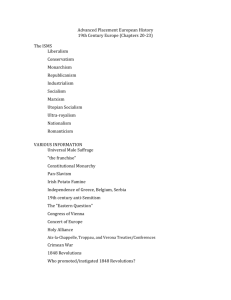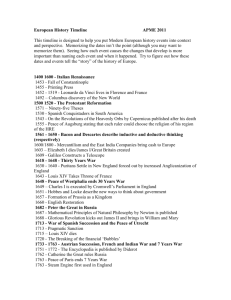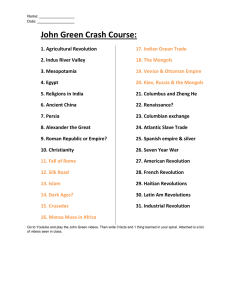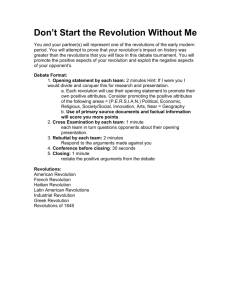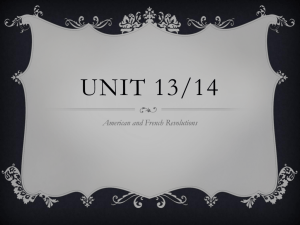Revolutions of 1848 Excerpts Analysis
advertisement
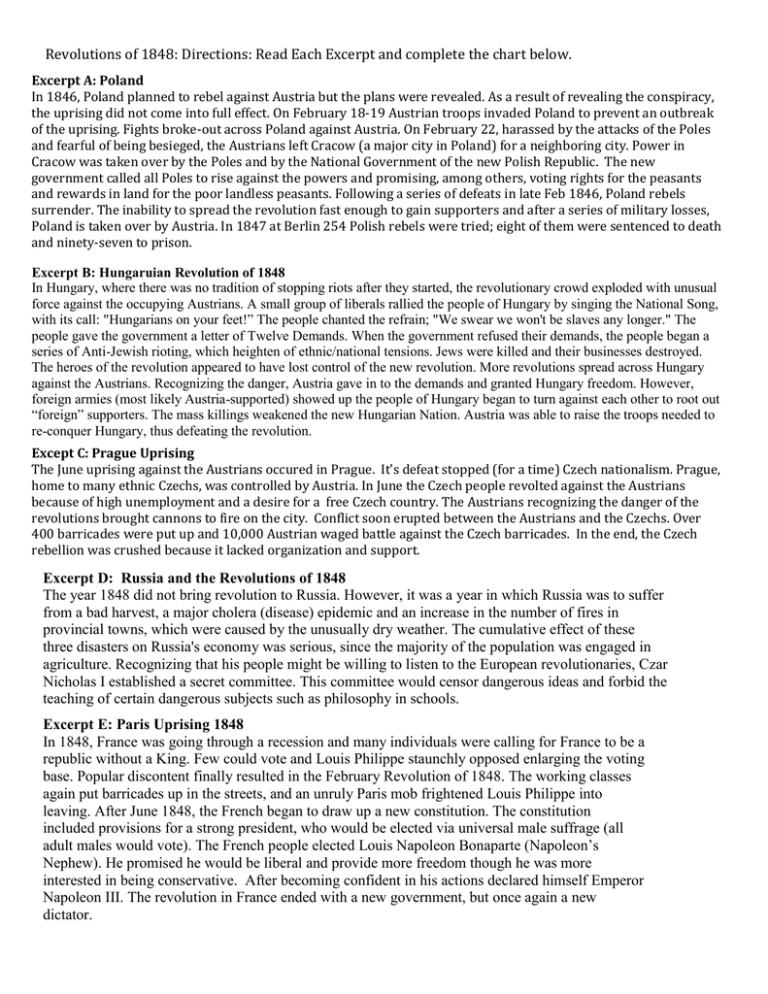
Revolutions of 1848: Directions: Read Each Excerpt and complete the chart below. Excerpt A: Poland In 1846, Poland planned to rebel against Austria but the plans were revealed. As a result of revealing the conspiracy, the uprising did not come into full effect. On February 18-19 Austrian troops invaded Poland to prevent an outbreak of the uprising. Fights broke-out across Poland against Austria. On February 22, harassed by the attacks of the Poles and fearful of being besieged, the Austrians left Cracow (a major city in Poland) for a neighboring city. Power in Cracow was taken over by the Poles and by the National Government of the new Polish Republic. The new government called all Poles to rise against the powers and promising, among others, voting rights for the peasants and rewards in land for the poor landless peasants. Following a series of defeats in late Feb 1846, Poland rebels surrender. The inability to spread the revolution fast enough to gain supporters and after a series of military losses, Poland is taken over by Austria. In 1847 at Berlin 254 Polish rebels were tried; eight of them were sentenced to death and ninety-seven to prison. Excerpt B: Hungaruian Revolution of 1848 In Hungary, where there was no tradition of stopping riots after they started, the revolutionary crowd exploded with unusual force against the occupying Austrians. A small group of liberals rallied the people of Hungary by singing the National Song, with its call: "Hungarians on your feet!” The people chanted the refrain; "We swear we won't be slaves any longer." The people gave the government a letter of Twelve Demands. When the government refused their demands, the people began a series of Anti-Jewish rioting, which heighten of ethnic/national tensions. Jews were killed and their businesses destroyed. The heroes of the revolution appeared to have lost control of the new revolution. More revolutions spread across Hungary against the Austrians. Recognizing the danger, Austria gave in to the demands and granted Hungary freedom. However, foreign armies (most likely Austria-supported) showed up the people of Hungary began to turn against each other to root out “foreign” supporters. The mass killings weakened the new Hungarian Nation. Austria was able to raise the troops needed to re-conquer Hungary, thus defeating the revolution. Except C: Prague Uprising The June uprising against the Austrians occured in Prague. It’s defeat stopped (for a time) Czech nationalism. Prague, home to many ethnic Czechs, was controlled by Austria. In June the Czech people revolted against the Austrians because of high unemployment and a desire for a free Czech country. The Austrians recognizing the danger of the revolutions brought cannons to fire on the city. Conflict soon erupted between the Austrians and the Czechs. Over 400 barricades were put up and 10,000 Austrian waged battle against the Czech barricades. In the end, the Czech rebellion was crushed because it lacked organization and support. Excerpt D: Russia and the Revolutions of 1848 The year 1848 did not bring revolution to Russia. However, it was a year in which Russia was to suffer from a bad harvest, a major cholera (disease) epidemic and an increase in the number of fires in provincial towns, which were caused by the unusually dry weather. The cumulative effect of these three disasters on Russia's economy was serious, since the majority of the population was engaged in agriculture. Recognizing that his people might be willing to listen to the European revolutionaries, Czar Nicholas I established a secret committee. This committee would censor dangerous ideas and forbid the teaching of certain dangerous subjects such as philosophy in schools. Excerpt E: Paris Uprising 1848 In 1848, France was going through a recession and many individuals were calling for France to be a republic without a King. Few could vote and Louis Philippe staunchly opposed enlarging the voting base. Popular discontent finally resulted in the February Revolution of 1848. The working classes again put barricades up in the streets, and an unruly Paris mob frightened Louis Philippe into leaving. After June 1848, the French began to draw up a new constitution. The constitution included provisions for a strong president, who would be elected via universal male suffrage (all adult males would vote). The French people elected Louis Napoleon Bonaparte (Napoleon’s Nephew). He promised he would be liberal and provide more freedom though he was more interested in being conservative. After becoming confident in his actions declared himself Emperor Napoleon III. The revolution in France ended with a new government, but once again a new dictator. The February Revolution of 1848 reverberated throughout Europe, resulting in a series of revolutions, most powerfully in Germany and Vienna. Excerpt F: Great Britain in 1848 To prevent revolution from occurring at home Great Britain instituted a series of reforms. Various reform bills were debated and passed in British Parliament. These laws gave more power to the growing cities in Britain and expanded voting rights for males. Free-trade was advocated and laws that put taxes on imported goods (particularly Corn) were removed. This helped lower the cost of food for British workers. In 1833, slavery everywhere in Britain, including its colonies, was outlawed. The death penalty was restricted only to a few major crimes. Laws to improve prison conditions were also passed. Hanging as an execution method was also banned. Labor conditions also improved. A 10-hour workday was passed as were laws aimed at regulating and promoting safety in mines. Other laws set minimum wages. The ability of workers to unite and form labor unions was also approved. These laws had the effect of stopping the revolutions of 1848 from spreading into the country. Chart to complete: How Start? What Happened? Why Unsuccessful? Poland Hungary Prague, Czech Russia Paris, France Great Britain Questions: 1. If you were the leader of one of the countries going through a revolution would you give into the demands and desires of the people even if meant you would lose your power, job, authority, and money or would you crush the revolution to retain your authority, power, money, and job? 2. Why were Great Britain and Russia able to prevent a revolution in 1848? 3. Why do you think most of the revolutions were unsuccessful? 4. What do you think is the major outcome of the revolutions?

